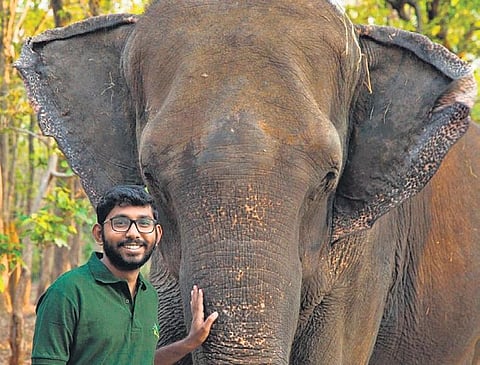

CHENNAI: India is a biodiversity-rich country with a population of 1.4 billion people and roughly 27,000 Asian elephants. Over the years, with urbanisation and rampant disappearance of wildlife habitat, the human-animal (elephant) conflict has been on the rise. Nearly 64 elephants and 58 people have succumbed to the conflict in Tamil Nadu in the last year,” shares naturalist Jeswin Kingsly, who, along with Santhosh Krishnan, has projected this pressing problem on the bigger screen with an 18-minute, award-winning documentary Kaliru.
Released on Monday, the film opened to raving reviews from renowned conservationists from across the globe for its sensitive approach to the serious topic. In a three part-sequence, the film offers a realistic picture of how people are affected by the pachyderms and vice versa. “The word Kaliru refers to elephants in Tamil. It’s ironic how we worship Ganesha but, then harass and harm an elephant for being a troublemaker. As residents of Coimbatore, this steady surge in conflict has been startling. Not wanting to be bystanders, we decided to shoot a film about this in June 2020 and it took six months to complete. We were constantly on ground, behind the elephants and studying their altered behaviour caused by agitated humans,” says Jeswin.
A relevant reminder
Narrated by reputed wildlife photographer Belinda Wright, the film walks us through three conflict-prone landscapes of Tamil Nadu. It highlights the Kallar corridor near Mettupalayam, which is frequented by hundreds of elephants in a year that migrate from Sathyamangalam Tiger Reserve to Coimbatore, and then to Kerala and Wayanad. Unfortunately, with agricultural fields and tea shops cropping up, the mammals are forced to take a longer route through town. “On their way, the animals have gotten used to sugarcane and banana plantations. Despite people chasing them with fire crackers and blaring noise, they continue to rummage the fields, satiate their appetite and head back. The farmers on the frontline are worst affected by the damage. Many lives have also been lost,” points out Santhosh, an assistant cameraman at Felis Creations, a Karnataka-based film production company.
Similarly in Hunsur, the check post between Tamil Nadu and Karnataka at the Dhimbam Ghat is another hotspot. “It’s in the middle of the forest because of the sharp hairpin bends. Trucks loaded with sugarcane get stuck for hours because of the height barrier. Elephants use this opportunity to raid crops. They are used to the loud horns; not affected by them anymore. The forest department is having a tough time with this,” details Santhosh.
Seeking solutions
On an average, elephants need about 150 kg of food and they migrate even 250 km to quench their hunger and thirst. Deforestation, shrinking corridors and human encroachment has worsened their plight. But, circumstances seem better in the jungle area of Valparai. “In the last four years, there have been no human deaths due to elephant conflicts. But, Valparai is the centre of Anaimalai. Elephants from Kerala pass through this area for migration and mating. With tea plantations and workers residing in the area, their regular routes have been fractured. Like these, every area has its own problem and needs to be dealt with accordingly. There’s no common solution. If these challenges persist then there will be no future for the animals in India,” cautions Jeswin.
The film intersperses its compelling narrative with scenes from a puppet show to lighten the subject. “Arulagam, a Coimbatore-based organisation, uses the art form to spread awareness among tribal villages. Taking inspiration from their work, we used puppets to convey the message in an engaging way. It’s been three months since we started screening it in different areas such as Madras Naturalists Society, Young Naturalists’ Network and some places in Mettupalayam. We want to screen it in schools and colleges to educate the coming generation. We will be collaborating with NGOs to spread the word,” details Santhosh. The film has been nominated and won many national and international recognitions.
‘Kaliru’ is available for viewing on Felis Creations TV’s YouTube Channel